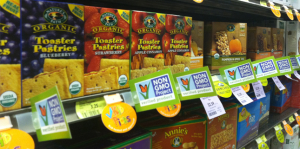What are Genetically Modified Organisms (GMO)? The beginner’s guide
I was browsing the aisles in my favorite local natural foods market recently and saw this:
I am somewhat familar with what GMOs are, but this display set off a little alarm in my head. Why is there such a push to advertise the non-gmo foods? As a major foodie I wanted to dig in and do some research.
What are GMOs? According to the Non-GMO project:
GMOs, or “genetically modified organisms,” are plants or animals created through the gene splicing techniques of biotechnology (also called genetic engineering, or GE). This experimental technology merges DNA from different species, creating unstable combinations of plant, animal, bacterial and viral genes that cannot occur in nature or in traditional crossbreeding.
What does that mean? Basically they’re creating seeds for plants that don’t naturally occur. In other words, they’re creating an unnatural franken-food.
Why would they do that?
- They can be produced in mass quantities
- They can be modified to have better taste
- They can have extra nutrients added
- They don’t need pesticides because the seed is resistant to everything
That last one made the hair on my neck stand up. Biotechnology companies are basically engineering GMO crops to resist direct application of herbicide. This allows the crop plants to live while surrounding weeds die. Wow. That doesn’t sound like something we should be eating, does it?
Last year there was a vote on Proposition 37 which demanded food labeling in California and although it wasn’t passed, it brought nationwide media attention on the issue. But still, most Americans aren’t aware of the extent that GMOs are infiltrating their food sources. Look how other countries feel about GMOs.
Michael Pollen summarized it best:
What is at stake this time around is not just the fate of genetically modified crops but the public’s confidence in the industrial food chain.
Scary fact: GMOs were just introduced into our food supply in the late 1990′s and no long term human or animal testing was conducted before the FDA approved them.
If they are using GMOs in everyday food without telling us, what else are they doing to our food that we don’t know about?
Top 10 genetically modified foods
Monsanto has been charged as leading the genetic engineering movement these days because they essentially have a monopoly on the market. They manufacture both the seed AND the pesticide that kills the other plants that are not the seeds.
The Roundup Ready seeds (which is their line of designer genetically-modified seeds) automatically immunize plants against Roundup, which is a powerful herbicide also made by Monsanto. Farmers can then readily apply Roundup to kill everything but the immunized seeds. But even the weeds are revolting against this practice.
As I did the research, the amount of information on this topic became overwhelming. Here are some things you can do to become part of the solution:
- Take action–let congress and the FDA know that you want labeling for GMO products.
- Be informed–here’s a detailed report on GMO Myths and Truths.
- Support manufacturers that provide non-gmo products. Every dollar you spend on non-gmo products is a vote! There’s even an App for it!
- Buy and plant heirloom seeds.
- Tell friends and family about this issue so everyone can make informed decisions.
When did we become so apathetic about our food supply? Holy moly–we’re so disconnected that they’re totally distorting the seeds we grow everything from! Tell me your opinions about this topic in the comments below.


